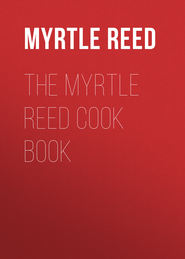По всем вопросам обращайтесь на: info@litportal.ru
(©) 2003-2024.
✖
Threads of Grey and Gold
Настройки чтения
Размер шрифта
Высота строк
Поля
Both of them greatly desired children, but this blessing was denied them; so they adopted a boy, the child of Mrs. Jackson’s brother, naming him “Andrew Jackson,” and bringing him up as their own child.
The lady’s portrait shows her to have been wonderfully attractive. It does not reveal the dusky Oriental tint of her skin, the ripe red of her lips, nor the changing lights in her face, but it shows the high forehead, the dark soft hair, the fine eyes, and the tempting mouth which was smiling, yet serene. A lace head-dress is worn over the waving hair, and the filmy folds fall softly over neck and bosom.
When Jackson was elected to the Presidency, the ladies of Nashville organized themselves into sewing circles to prepare Mrs. Jackson’s wardrobe. It was a labour of love. On December 23, 1828, there was to be a grand banquet in Jackson’s honour, and the devoted women of their home city had made a beautiful gown for his wife to wear at the dinner. At sunrise the preparations began. The tables were set, the dining-room decorated, and the officers and men of the troop that was to escort the President-elect were preparing to go to the home and attend him on the long ride into the city. Their horses were saddled and in readiness at the place of meeting. As the bugle sounded the summons to mount, a breathless messenger appeared on a horse flecked with foam. Mrs. Jackson had died of heart disease the evening before.
The festival was changed to a funeral, and the trumpets and drums that were to have sounded salute were muffled in black. All decorations were taken down, and the church bells tolled mournfully. The grief of the people was beyond speech. Each one felt a personal loss.
At the home the blow was terrible. The lover-husband would not leave his wife. In those bitter hours the highest gift of his countrymen was an empty triumph, for his soul was wrecked with the greatness of his loss.
When she was buried at the foot of a slope in the garden of “The Hermitage,” his bereavement came home to him with crushing strength. Back of the open grave stood a great throng of people, waiting in the wintry wind. The sun shone brightly on the snow, but “The Hermitage” was desolate, for its light and laughter and love were gone. The casket was carried down the slope, and a long way behind it came the General, slowly and almost helpless, between two of his friends.
The people of Nashville had made ready to greet him with the blare of bugles, waving flags, the clash of cymbals, and resounding cheers. It was for the President-elect – the hero of the war. The throng that stood behind the open grave greeted him with sobs and tears – not the President-elect, but the man bowed by his sixty years, bareheaded, with his gray hair rumpled in the wind, staggering toward them in the throes of his bitterest grief.
In that one night he had grown old. He looked like a man stricken beyond all hope. When his old friends gathered around him with the tears streaming down their cheeks, wringing his hand in silent sympathy, he could make no response.
He was never the same again, though his strength of will and his desperate courage fought with this infinite pain. For the rest of his life he lived as she would have had him live – guided his actions by the thought of what his wife, if living, would have had him do – loving her still, with the love that passeth all understanding.
He declined the sarcophagus fit for an emperor, that he might be buried like a simple citizen, in the garden by her side.
His last words were of her – his last look rested upon her portrait that hung opposite his bed, and if there be dreaming in the dark, the vision of her brought him peace at last.
The Bachelor President’s Loyalty to a Memory
The fifteenth President was remarkable among the men of his time for his lifelong fidelity to one woman, for since the days of knight-errantry such devotion has been as rare as it is beautiful. The young lawyer came of Scotch-Irish parentage, and to this blending of blood were probably in part due his deep love and steadfastness. There was rather more of the Irish than of the Scotch in his face, and when we read that his overflowing spirits were too much for the college in which he had been placed, and that, for “reasons of public policy,” the honours which he had earned were on commencement day given to another, it is evident that he may sometimes have felt that he owed allegiance primarily to the Emerald Isle.
Like others, who have been capable of deep and lasting passion, James Buchanan loved his mother. Among his papers there was found a fragment of an autobiography, which ended in 1816, when the writer was only twenty-five years of age. He says his father was “a kind father, a sincere friend, and an honest and religious man,” but on the subject of his mother he waxes eloquent:
“Considering her limited opportunities in early life [he writes], my mother was a remarkable woman. The daughter of a country farmer, engaged in household employment from early life until after my father’s death, she yet found time to read much, and to reflect deeply on what she read.
“She had a great fondness for poetry, and could repeat with ease all the passages in her favorite authors which struck her fancy. These were Milton, Pope, Young, Cowper, and Thompson.
“I do not think, at least until a late period in life, she had ever read a criticism on any one of these authors, and yet such was the correctness of her natural taste, that she had selected for herself, and could repeat, every passage in them which has been admired…
“For her sons, as they grew up successively, she was a delightful and instructive companion… She was a woman of great firmness of character, and bore the afflictions of her later life with Christian philosophy… It was chiefly to her influence, that her sons were indebted for a liberal education. Under Providence I attribute any little distinction which I may have acquired in the world to the blessing which He conferred upon me in granting me such a mother.”
If Elizabeth Buchanan could have read these words, doubtless she would have felt fully repaid for her many years of toil, self-sacrifice, and devotion.
After the young man left the legislature and took up the practice of law, with the intention of spending his life at the bar, he became engaged to Anne Coleman, the daughter of Robert Coleman, of Lancaster.
She is said to have been an unusually beautiful girl, quiet, gentle, modest, womanly, and extremely sensitive. The fine feelings of a delicately organized nature may easily become either a blessing or a curse, and on account of her sensitiveness there was a rupture for which neither can be very greatly blamed.
Mr. Coleman approved of the engagement, and the happy lover worked hard to make a home for the idol of his heart. One day, out of the blue sky a thunderbolt fell. He received a note from Miss Coleman asking him to release her from her engagement.
There was no explanation forthcoming, and it was not until long afterward that he discovered that busy-bodies and gossips had gone to Miss Coleman with stories concerning him which had no foundation save in their mischief-making imaginations, and which she would not repeat to him. After all his efforts at re-establishing the old relations had proved useless, he wrote to her that if it were her wish to be released from her engagement he could but submit, as he had no desire to hold her against her will.
The break came in the latter part of the summer of 1819, when he was twenty-eight years old and she was in her twenty-third year. He threw himself into his work with renewed energy, and later on she went to visit friends in Philadelphia.
Though she was too proud to admit it, there was evidence that the beautiful and high-spirited girl was suffering from heartache. On the ninth of December, she died suddenly, and her body was brought home just a week after she left Lancaster. The funeral took place the next day, Sunday, and to the suffering father of the girl, the heart-broken lover wrote a letter which in simple pathos stands almost alone. It is the only document on this subject which remains, but in these few lines is hidden a tragedy:
“Lancaster, December 10, 1819.
“My Dear Sir:
“You have lost a child, a dear, dear child. I have lost the only earthly object of my affections, without whom, life now presents to me a dreary blank. My prospects are all cut off, and I feel that my happiness will be buried with her in her grave.
“It is now no time for explanation, but the time will come when you will discover that she, as well as I, has been greatly abused. God forgive the authors of it! My feelings of resentment against them, whoever they may be, are buried in the dust.
“I have now one request to make, and for the love of God, and of your dear departed daughter, whom I loved infinitely more than any human being could love, deny me not. Afford me the melancholy pleasure of seeing her body before its interment. I would not, for the world, be denied this request.
“I might make another, but from the misrepresentations that have been made to you, I am almost afraid. I would like to follow her remains, to the grave as a mourner. I would like to convince the world, I hope yet to convince you, that she was infinitely dearer to me than life.
“I may sustain the shock of her death, but I feel that happiness has fled from me forever. The prayer which I make to God without ceasing is, that I yet may be able to show my veneration for the memory of my dear, departed saint, by my respect and attachment for her surviving friends.
“May Heaven bless you and enable you to bear the shock with the fortitude of a Christian.
“I am forever, your sincere and grateful friend,
”James Buchanan.”
The father returned the letter unopened and without comment. Death had only widened the breach. It would have been gratifying to know that the two lovers were together for a moment at the end.
For such a meeting as that there are no words but Edwin Arnold’s:
“But he – who loved her too well to dread
The sweet, the stately, the beautiful dead —
He lit his lamp, and took the key,
And turn’d it! – alone again – he and she!”
For him there was not even a glimpse of her as she lay in her coffin, nor a whisper that some day, like Evelyn Hope, she might “wake, and remember and understand.” With that love that asks only for the right to serve, and feeling perhaps that no pen could do her justice, he obtained permission to write a paragraph for a local paper, which was published unsigned:
“Departed this life, on Thursday morning last, in the twenty-third year of her age, while on a visit to friends in the city of Philadelphia, Miss Anne C. Coleman, daughter of Robert Coleman, Esquire of this city.
“It rarely falls to our lot to shed a tear over the remains of one so much and so deservedly beloved as was the deceased. She was everything which the fondest parent, or the fondest friend could have wished her to be.
“Although she was young and beautiful and accomplished, and the smiles of fortune shone upon her, yet her native modesty and worth made her unconscious of her own attractions. Her heart was the seat of all the softer virtues which ennoble and dignify the character of woman.
“She has now gone to a world, where, in the bosom of her God, she will be happy with congenial spirits. May the memory of her virtues be ever green in the hearts of her surviving friends. May her mild spirit, which on earth still breathes peace and good will, be their guardian angel to preserve them from the faults to which she was ever a stranger.
“The spider’s most attenuated thread
Is cord, is cable, to man’s tender tie
On earthly bliss – it breaks at every breeze.”
How deeply he felt her death is shown by extracts from a letter written to him by a friend in the latter part of December:
“I am writing, I know not why, and perhaps had better not. I write only to speak of the awful visitation of Providence that has fallen upon you, and how deeply I feel it… I trust to your philosophy and courage, and to the elasticity of spirits natural to most young men…
“The sun will shine again, though a man enveloped in gloom always thinks the darkness is to be eternal. Do you remember the Spanish anecdote?











